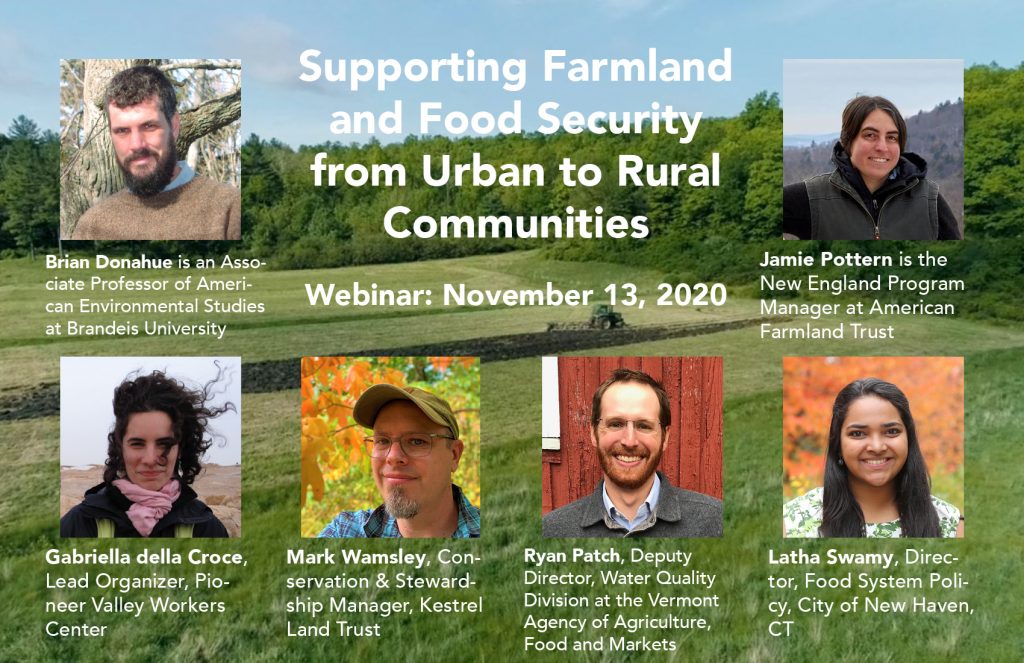During the last of three webinars leading up to the full-day virtual RCP Network Gathering on November 19, a group of speakers from across New England shared how resilient agriculture is essential to food security in their communities.

Moderated by Jamie Pottern, New England Program Manager, American Farmland Trust, and Brian Donahue, Associate Professor, Brandeis University and Senior Fellow, Highstead, the webinar consisted of three presentations touching on three approaches to building resilient agriculture: securing access to urban farmland, creating payments for ecosystem services for farmers who maintain soil health, and providing access to farmland for historically disadvantaged and immigrant farmers of color. Together, the speakers, moderators and participants helped define what RCPs can do to contribute to food security and farm viability across the region.
The first presentation was given by Latha Swamy, Director or Food System Policy in the city of New Haven, CT. Latha — the first person to ever serve in this capacity — works to create an equitable and enabling policy environment for urban agriculture, especially in low-income communities and communities of color. She and her partners face a variety of obstacles including opaque city processes that can be difficult to navigate, non-existent and outdated zoning regulations and land-use policies (including the remnants of racist practices such as redlining), difficult-to-access knowledge and financial resources for urban agricultural initiatives, and the concern that their work could be a catalyst for displacement and gentrification. Latha shared her approach to overcoming these obstacles: building coalitions, changing city regulations, and providing resources to help urban agriculture thrive in New Haven, bringing health, economic, and environmental benefits for its residents.
Ryan Patch, Deputy Director of the Water Quality Division at the Vermont Agency of Agriculture, Food, and Markets gave the second presentation. He focused on finding ways to pay farmers for the ecosystem services they provide. Farms in Vermont provide a wide array of services to their surrounding communities beyond the food they produce, including water purification, erosion prevention, bringing beauty to landscape, and much more. Ryan described how the Vermont Payment for Ecosystem Services Working Group has devised a system to pay farmers for these services, supporting both the environmental resilience of their surrounding communities and also the economic resilience of small farms. Learn more about this program here.
The third presentation was given by Mark Wamsley, Conservation & Stewardship Manager, Kestrel Land Trust; Gabriella della Croce, Lead Organizer, Pioneer Valley Workers Center; and Lorena Moreno, Worker, Owner, and Sales Manager at Riquezas Del Campo. Gabriella shared information about the Pioneer Valley Workers Center, a small grass-roots organization that supports undocumented Central American immigrant workers and farmers. They provide power to these workers, who often face difficult working conditions, through collective action and developing economic alternatives, such as the immigrant-run cooperative farm, Riquezas Del Campo. Mark then described how Kestrel Land Trust helped the Workers Center acquire the land that became Riquezas Del Campo, and Lorena, with her perspective as a former healthcare worker, spoke about the ways Riquezas Del Campo is addressing healthcare problems in immigrant communities, and shared her experience running the farm for the past two years.
The presentations were followed by a lively Q&A session with webinar attendees.